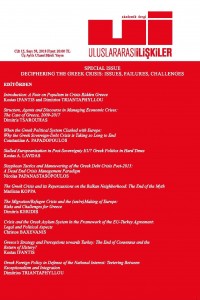Abstract
2015’te patlak veren göç ve mülteci krizi Yunanistan’ı, dış politika ve güvenliğin yanı sıra bir dizi insani, siyasi, sosyal ve finansal sorunla da karşı karşıya getirdi. Atina, dar görüşlü solcu bir bakış açısıyla şekillendirilen ve neredeyse büyük bir felakete dönüşen açık-kapı politikasının ardından, Almanya ile yakınlaştı. Türkiye’den mülteci akışını büyük ölçüde azaltan AB-Türkiye anlaşmasını destekledi ve NATO deniz gücünü ilgili sözleşmenin uygulanmasını denetlemek üzere davet etti. Bu çalışma, iki bölümden oluşmaktadır. İlk bölümde, göç ve mülteci krizi küresel, Avrupa ve ulusal-Yunan perspektifinden açıklamaktadır. İkinci kısımda ise, Avrupa’da zorluklarla mücadele şeklinde tanımlanana bir dönemde, Yunanistan’ın karşılaştığı riskler ve verilen politika tepkileri ile bunların ülkenin genel jeostratejik pozisyonuyla nasıl ilişkilendirildiği üzerinde durulmaktadır.
Keywords
References
- ......
Abstract
The migration and refugee crisis that erupted in 2015 landed recession riven Greece with a series of humanitarian, political, social, and financial as well as foreign policy and security challenges. Following a near disastrous open-borders policy steeped in leftist ideological parochialism, Athens aligned itself closely with Germany in support of the EU-Turkey deal that drastically reduced the human flows from Turkey into the EU and invited NATO naval forces to help monitor the implementation of the agreement.This paper is structured around two parts: the first part describes the immigration and refugee crisis itself, from a global, European and national-Greek perspective; the second part analyzes the risks to and policy responses of Greece and how they relate to the country’s overall geostrategic position, at a time when Europe is being redefined as it struggles to respond to a multitude of challenges.
Keywords
References
- ......
Details
| Primary Language | English |
|---|---|
| Journal Section | Articles |
| Authors | |
| Publication Date | June 1, 2018 |
| Published in Issue | Year 2018 Special Issue: Deciphering the Greek Crisis: Issues, Failures, Challenges |


